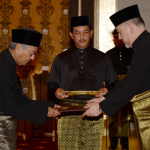A new – but uncertain – dawn promises to break over Malaysia.
Earlier this month, the opposition Pakatan Harapan coalition, led by Mahathir Mohamad, won a memorable election victory, upsetting the United Malays National Organisation’s (UMNO) six-decade run. Mahathir served as Malaysia’s PM from 1981 to 2003 and is now being projected as the harbinger of reform within the country. But what does his win bode for the country’s foreign policy?
There are two aspects to this change of guard. A new age in Malaysia may take its time coming as the transition period may be of longer duration. Mahathir, 92, has said he will serve as prime minister for “one or two years” and then guide the coalition government from behind the scenes. His protégé-turned-foe-turned-ally, Anwar Ibrahim, is a free man now, but he may have to wait for quite some time before he becomes a member of parliament and prime minister-in-waiting. Meanwhile, the new government faces the daunting challenge of how to address massive corruption scandals involving the previous prime minister, Najib Rajak.
The second aspect is that Mahathir now faces the new dynamics of Asia’s geopolitics, a vastly different scenario from the one in 2003 when he ended his long tenure as PM.[1] At that time, the United States was the undisputed leader in the Asia-Pacific; Malaysia, Singapore and others were the champions of “Asian values”; and Mahathir, with his authoritarian tendencies, pro-Islamic inclinations, and strong hostility to the West and Israel, was a tall leader in South East Asia. What he inherits today is a China-dominated East Asia or Indo-Pacific, with the U.S. disinterested in a leadership role, except in the Korean Peninsula.
The South China Sea issue, which has headlined strategic discourse in recent years, saw Malaysia adopt a soft and cautious approach towards China. This partially contributed to weakening the resolve of the Association of South East Asian Nations in countering Beijing’s aggressive behaviour. Will Kuala Lumpur under Mahathir’s leadership now play the power game differently?
This is where internal politics and external relations intersect. The Mahathir-led coalition, now the ruling dispensation, has been critical of Najib’s policy of allowing huge investments by Chinese companies in Malaysia’s real estate sector which has made housing expensive for Malaysians – and probably deserves review.
Mahathir also spoke against Malaysia’s over-reliance on Chinese finance and technology for building mega infrastructure projects such as the East Coast Rail Link. This will connect Kuala Lumpur with the less developed eastern regions and cost $13 billion. Will his government cancel this project? He has spoken out against some aspects of China’s Belt and Road Initiative (BRI), especially its potential to lay debt traps for beneficiary countries.[2] Beijing, New Delhi and the other ASEAN capitals will be watching closely whether he will pursue these reservations or allow pragmatism to prevail and become conciliatory towards China. In case of some trouble in the China-Malaysia equation, Japan may discover new opportunities for economic cooperation.
China-Malaysia relations are imbued with uncertainty. The other important partners are the U.S., Japan, India and Australia. Australia used to be a frequent recipient of Mahathir’s ire for being ‘deputy sheriff’ to the U.S. as the global policeman: history may not necessarily repeat itself. Malaysian radio broadcaster Umpagan Ampikaipakan, speaking of Malaysia’s ties with the U.S. under Mahathir in the past, has said that it was “an interesting relationship.” He explained that Mahathir “was publicly very critical about America and American policies, but privately … we discovered that actually he had a very close relationship with America.”[3]
ASEAN will see Mahathir playing an active, even assertive, role as elder statesman – but in coordination with Singapore, the current chair. “Malaysia is a vital partner of Singapore, and our peoples share strong and deep bonds,” observed Lee Hsien Loon, Singapore’s prime minister when congratulating Mahathir. “We can do much more together,”[4] he added. Early meetings between the two leaders and imminent ones between Mahathir and Indonesian President Jokowi Widodo, will indicate ASEAN’s future directions. Myanmar, however, can find itself in a difficult spot, given Mahathir’s critical stance on its treatment of the Rohingya people. Mahathir’s relations with Bangladesh may get a boost.
Mahathir will find India to be quite a different nation from what it was prior to the days of the first term of the United Progressive Alliance’s time in power. The Najib government was consistent in building up a relationship of trust and close economic cooperation with New Delhi.[5] Mahathir is likely to grasp accurately the importance of a resurgent India and its value as a balancing factor in South East Asia. He may, therefore, overcome his past biases and find a way to connect well with Prime Minister Narendra Modi’s government.
The last chapter in Prime Minister’s Mahathir Mohamad’s political journey will thus be moulded not only by Malaysia’s internal politics, but also by the changing dynamics of Asia’s geopolitics.
Rajiv Bhatia is Distinguished Fellow, Gateway House. He is a former ambassador to Myanmar. With long diplomatic experience of the region, he comments regularly on developments in Southeast Asia.
This article was exclusively written for Gateway House: Indian Council on Global Relations. You can read more exclusive content here.
For interview requests with the author, or for permission to republish, please contact outreach@gatewayhouse.in or 022 22023371.
© Copyright 2018 Gateway House: Indian Council on Global Relations. All rights reserved. Any unauthorized copying or reproduction is strictly prohibited.
References
[1] ‘Mahathir as the leader of Malaysia’, Facts and Details, <http://factsanddetails.com/southeast-asia/Malaysia/sub5_4a/entry-3627.html>
[2] Panda, Ankit, ‘Malaysia wont look away from China so soon, despite Mahathir’s words’, The Diplomat, 20 May 2018, <https://thediplomat.com/2018/05/malaysia-wont-look-away-from-china-so-soon-despite-mahathirs-words/>
[3] Westerman, Ashley, Michael Sullivan, ‘In election upset, Malaysia’s Mahathir returns to power after 15 years’, NPR, 10 May 2018, <https://www.npr.org/sections/thetwo-way/2018/05/10/609952050/in-election-upset-malaysias-mahathir-returns-to-power-after-a-quarter-century>
[4] ‘PM Lee confratulates PM Mahathir on his swearing in, hopes to ctach up in person’, The Straits Times, 10 May 2018, <https://www.straitstimes.com/singapore/pm-lee-congratulates-pm-mahathir-on-his-swearing-in-hopes-to-catch-up-in-person>
[5] Bhatia, Rajiv, ‘India-Malaysia partnership in the pink’, Gateway House: Indian Council on Global Relations, 24 May 2017, <https://www.gatewayhouse.in/india-malaysia-at-60/>


